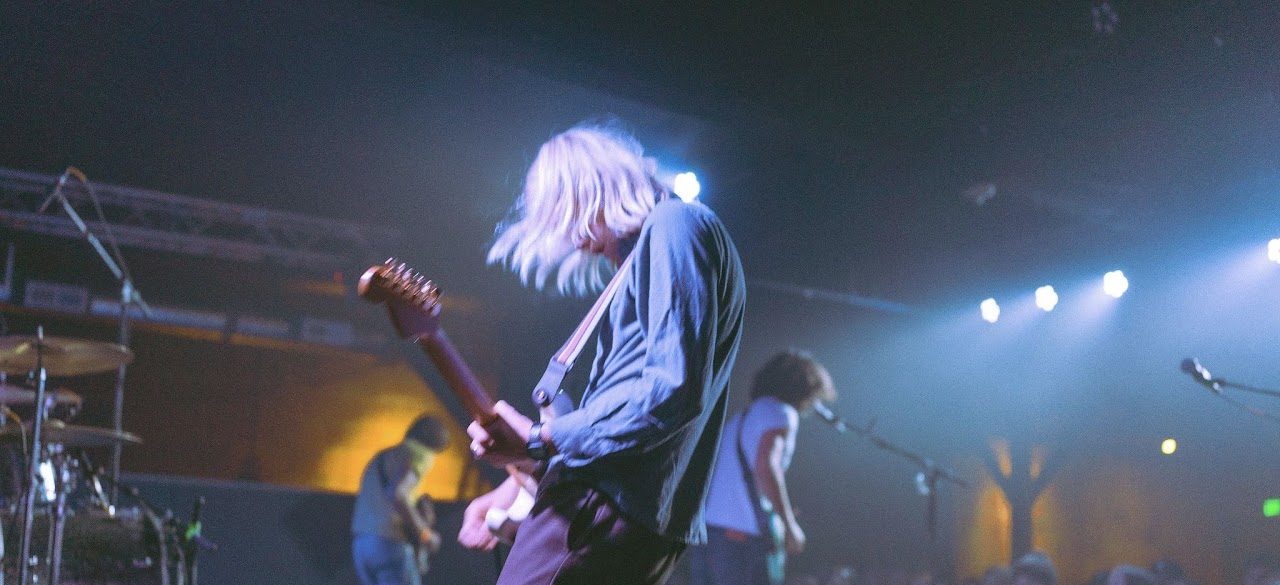Salt Lake City’s music scene hums with contradictions—snow-dusted mountains meet basement punk shows, and quiet folk ballads echo through local venues. This winter, SLC artists have released tracks that capture that tension. One song spills out of a car radio as someone drives State Street late at night. Another drifts from Kilby Court, where a singer with calloused fingers strums an acoustic guitar. Each release this season carries a piece of Salt Lake.
Check out these seven tracks and find your next winter anthem!
Decoys – Sunset Station
“‘Decoys’ was written over the process of a few weeks. Having to drive through the desert and seeing the start landscapes around me got me into a certain headspace which led to the instrumental part being written first. Decoys is my favorite Sunset Station track so far because I was able to borrow influences from all my favorite genres and make it into something really special.” – Sunset Station
Imagine stepping into a dimly lit room, the air thick with a sense of mystery and anticipation.
As “Decoys” by Sunset Station begins, a slow electric guitar gently weaves its way into your consciousness, accompanied by the haunting echo of a distant voice that seems to whisper from the shadows. The steady drumbeat joins in, adding a rhythmic pulse to the ethereal, ghostlike noises that swirl in the background, creating a landscape of sound that feels both eerie and strangely familiar.
The lyrics unfold like a cryptic message, painting a portrait of someone with a smile uncannily resembling your own—a decoy, perhaps. Each word echoes softly, bouncing from ear to ear. As the song reaches its crescendo, the haunting refrain of “Who are you” echoes one last time, drifting away into the distance like a whispered question left hanging in the air.
Listening to “Decoys” is like exploring a hidden passage in an old, forgotten mansion—full of secrets, intrigue, and a touch of melancholic beauty.
Drift – The Wildfires
“‘Drift’ is an album with many voices. I wanted the music to sound like the words—raw and vulnerable. The songs grapple with love and loss, hopelessness and redemption, sickness and salvation, belief and disenchantment, gratitude and grief, magic and madness. I wanted this album to sound like life as we were experiencing it—chaotic and imperfect, but beautiful and magical and meaningful.” – The Wildfires
Listening to “Drift” by The Wildfires feels like walking through a city at 3 a.m. when everything is still but not quite silent. Streetlights hum. The occasional car rolls by, headlights stretching long shadows across the pavement.
The album sets the mood right away with “Inferno,” opening on a cymbal-heavy drumbeat that sways more than pounds. A slow, cool guitar seeps in, and then the vocals are drawn out, deliberate, like the speaker chooses each word carefully, or maybe just too tired to rush.
Every song follows that same hypnotic, melancholic pulse. But then “Overview Effect” comes in and swaps the guitar for a piano. It’s still slow, still dark, and if anything, leans even more into that gothic atmosphere. The vocals remain unchanged—steady, detached but intimate like a narrator watching the world burn from a safe distance.
What makes “Drift” work is the commitment to its sound. Many albums try to be everything at once and end up saying nothing. This one picks a lane and stays in it. It’s brooding, but not in a way that feels forced. That slow, melancholy voice you hear is oddly soothing like someone singing you to sleep while the world quietly unravels outside.
Like We Used To – Indigo Waves
“‘Like We Used To’ is about the never-ending changes of how you embrace the relationships in your life, both with yourself and with others. It’s a constant tug-of-war game between feeling lucky and feeling guilty, feeling invested and feeling worn out and any other dichotomy you can think of. The saving point of it all is you can always restart and ‘pick yourself back up just like we used to’” – Indigo Waves
“Like We Used To” by Indigo Waves feels like a snapshot of a summer that never really ended. It’s got that classic indie, upbeat energy, drenched in just the right amount of nostalgia. It’s the kind of song that makes you want to take the long way home, windows down, letting the warm night air blur the past and present together.
It’s on-brand for Indigo Waves. The vocals glide over the track with that hazy, dreamy effect, pulling you straight back to high school summers—walking to the gas station with your friends, pockets full of loose change, the night stretching out ahead like it’s got no end. Every chorus is cut through by this ridiculously catchy guitar riff that feels almost too good.
The band has their fingerprints all over this track, and you can finally see an album coming together. A sound that’s not just nostalgic but cohesive—like they’ve figured out exactly who they are.
It’s the kind of song that sticks with you, not only because it sounds good but because it feels like something real. Something you’ve lived, or maybe something you’re still living.
Heart Breaker – future.exboyfriend
“Recording and writing the songs on Semi-Pro, ‘Heart Breaker’ was a really fun and cathartic experience. I really tried to push things in a different way both sonically and lyrically from our previous album. The goal with these EPs was to be more brutally honest lyrically and say things that are a little scary to sing about. We split the EP’s up in two different projects to help further tell the story”
“Heart Breaker” by future.exboyfriend is the kind of EP that makes you want to move. Not just tap-your-foot move—actually get up, grab the first cutie you see, and let the night take over. It’s electric, pulsing with that perfect mix of desire, recklessness and late-night adrenaline. If “Semi Pro” was the setup, this is the payoff.
It kicks off with “Missing Out,” wasting no time before dropping you into this swirling, electronic sound wave that immediately gives off The Neighbourhood vibes. Then the beat hits—layered, engineered, polished but not too clean. It’s the kind of production that feels intentional, like when Jack Antonoff pieces together a hundred different sounds and somehow makes it all work.
Lyrically, “Heart Breaker” stays on theme—single, mingling and fully embracing the chaos of it all. Passion, desire, that push and pull of wanting something just out of reach. It’s all there, stitched together with glossy production and an energy that doesn’t let up.
This is the EP you throw on before heading out for the night, or maybe after, when you’re still buzzing from the neon and the noise. Either way, it does what it’s meant to—keeps you moving and keeps you wanting more.
I Call All My Homies Babygirl – Mopsy
“I feel like the biggest difference with this release would be the fact that this is the first of, hopefully, many singles that we plan on releasing with no intention of them appearing on an album. We’ve kind of come to terms that with modern music marketing it’s a lot easier to just advertise a song at a time, instead of trying to work at a whole album. It seems like the hype around a “new release” really only lasts a couple weeks at most. With that in mind, it gave recording and releasing the song a lot less pressure.
The other big thing with this release was this was the first song we’ve recorded with our newest addition to the band George Christensen. Although I don’t think it’s as noticeable of a difference for our listeners on this release. There was a lot of small ideas and changes in production and writing for us that I’m excited to see evolve with him included in Mopsy now.” – Mopsy
Mopsy just gets it. “I Call All My Homies Babygirl” is the exact track that makes their live shows unforgettable. It kicks off with that classic Mopsy punk energy—electric guitar ripping through the silence, fast, chaotic, barely giving you a second to catch up before it settles into a steady, driving beat. Controlled chaos.
Then there’s the vocals. No one does it like Mopsy’s lead vocalist Capp. He doesn’t just yell—he drags the words out, stretching every syllable like it’s got something to prove. And then come the oo’s in the chorus. Picture a packed venue, bodies pressed together, everyone shouting the words right back.
Mopsy has always been the Salt Lake City band to see live, and this one’s going to be a hit. No question. It’s got all the right pieces—energy, grit, a chorus built for screaming along.
Dogwood – Boyfriend Sushi town
“The writing process for ‘Dogwood’ started pretty much immediately after we finished recording our last record. I had a few songs written but a majority of the album was written in a span of three months. Our other two records were written over a longer time period and I think sound more eclectic and exploratory because of this. I think that ‘Dogwood’ being written in such a short frame of time made it our most cohesive work as a group. This time around, we all really nailed down what makes a boyfriend sushi song, a boyfriend sushi song.” – Boyfriend Sushi Town
“Dogwood” by Boyfriend Sushi Town is one of those albums that somehow feels like three different genres at once but never loses itself. It’s punk, it’s indie, maybe even a little folk? Every track feels distinct, but together, they build something that just works.
It kicks off with “Beholder,” this electrified indie-punk explosion. The guitar hits first—strong, steady—then a violin sneaks in. It adds this eerie, swirling texture behind the chaos. The drumbeat pulls you in, the lyrics come fast, and then—just when you think you’ve got the song figured out—it shifts. The violin gets louder, and the whole thing morphs into something hypnotic, softer but still pulsing with energy.
The title track, “Dogwood,” flips things again. It starts slow, haunted by this ghostly guitar line, maybe another violin in the mix. Then the drums crash in bringing that punk energy back, but oddly enough, the mood stays low. It’s louder, it’s stronger but it doesn’t shake off that eerie stillness. Feels like running full speed in the dark, knowing you’re about to trip but not knowing when.
Vlade Divac (Small Town, Big Water) // Scot Pollard – Spencer Kilpatrick and The Sand Gators
“These are part of a project that kind of started out as a bit. I just started writing little riffs and labeling them as the names of my favorite players from the 2002 Sacramento Kings in my voice memos. I was listening to a lot of psychedelic, fuzzed out r&b from the 70s and the songs slowly morphed into these little grooves
I wanted to capture the immediacy and maybe flippancy with which they were written so I booked us two days at The Atomic Garden in Oakland and we used one day for tracking and one for mixing and that was about it.
The band rips. Dan Weiss & Ivan Gates are a dream team of a rhythm section with a deep appreciation of rhythm & blues. Rachael McElhiney’s bari sax has a really unique, guttural presence that fits nicely with Dani’s single-note fuzz guitar playing. And all the vocals are gang vocals. It’s all a little fast and loose.” – Spencer Kilpatrick and The Sand Gators
Spencer Kilpatrick and The Sand Gators just dropped two songs that feel like they were ripped from a different time, maybe even a different universe. “Vlade Divac (Small Town, Big Water)” and “Scot Pollard” are full-blown experiences, the kind that makes you forget where you are for a minute.
“Vlade Divac” kicks off with a groove so smooth you can’t help but snap along. The rhythm section locks in tight, and then those harmonized vocals come in—like a choir decided to start a funk band. The whole thing sounds like it was recorded in some smoky studio decades ago, maybe the late ‘80s, but with an energy that feels completely fresh. And then there’s the sax. It doesn’t just fill the space—it owns it. That solo is unreal. The kind of thing you want to rewind and play again before the song even ends.
Then there’s “Scot Pollard,” which shifts gears but keeps the magic going. Another groove-heavy intro, this time led by a hypnotic guitar riff that just won’t let up. The song builds and builds, and right when you think it’s about to explode, everything drops. Clapping. Chanting. The voices rise in these layered oohs and ahhs, pulling you in before the drums come crashing back, inviting the guitar and everything else to rejoin the party. It’s a cycle of tension and release that makes you want to move.




